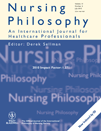
Nursing Philosophy
Scope & Guideline
Exploring the Ethical Frontiers of Nursing Practice
Introduction
Aims and Scopes
- Philosophical Foundations of Nursing:
The journal emphasizes the importance of philosophical frameworks in understanding nursing practice, ethics, and education. It encourages exploration of various philosophical traditions, including phenomenology, posthumanism, and decolonial theory, to enrich the nursing profession. - Critical Reflection on Nursing Practices:
Nursing Philosophy promotes critical examination of nursing practices and policies, encouraging nurses to reflect on their roles within complex healthcare systems. This includes addressing issues of power, equity, and social justice in nursing. - Interdisciplinary Approaches:
The journal advocates for interdisciplinary dialogue, integrating insights from fields such as sociology, ethics, and political theory to enhance nursing scholarship and practice. This approach fosters a holistic understanding of patient care and the healthcare environment. - Person-Centered Care and Human Dignity:
A core focus is on person-centered care, emphasizing the importance of understanding patients' narratives, experiences, and dignity within the healthcare context. The journal seeks to explore how philosophical insights can inform compassionate and ethical care. - Decolonization and Diversity in Nursing:
Nursing Philosophy highlights the need for decolonizing nursing knowledge and practices, advocating for the inclusion of diverse perspectives, particularly those of marginalized groups. The aim is to challenge dominant narratives in nursing and promote equity.
Trending and Emerging
- Social Justice and Equity in Healthcare:
Recent publications demonstrate an increasing focus on social justice issues, particularly in relation to health equity and the experiences of marginalized populations. This trend highlights the importance of addressing systemic inequalities within healthcare systems. - Decolonization of Nursing Knowledge:
There is a growing emphasis on decolonizing nursing practices and knowledge systems. This theme seeks to challenge Western-centric narratives and incorporate Indigenous and diverse perspectives, promoting a more inclusive approach to nursing education and practice. - Digital Health and Technology in Nursing:
The integration of digital health technologies and their implications for nursing practice is gaining prominence. Discussions around telehealth, digital ethics, and the impact of technology on patient care reflect the changing landscape of healthcare. - Philosophical Engagement with Mental Health:
An emerging focus on the philosophical dimensions of mental health nursing is evident, with increased discourse on topics such as existentialism, subjectivity, and the complexities of caring for individuals with mental health challenges. - Intersectionality in Nursing:
The journal is increasingly exploring intersectional frameworks that examine how various social categories (race, gender, class) intersect to shape nursing experiences and patient care. This trend reflects a broader commitment to understanding diversity and its implications in nursing.
Declining or Waning
- Traditional Biomedical Models:
There is a noticeable decrease in discussions centered around traditional biomedical models of care. The journal is moving towards more holistic and person-centered frameworks, indicating a shift away from purely clinical or disease-focused perspectives. - Historical Perspectives on Nursing:
Research that solely focuses on historical accounts of nursing practices is appearing less frequently. Instead, current publications favor contemporary issues and philosophical inquiries that directly impact modern nursing practice and education. - Nursing Theory Development:
While nursing theories remain important, there has been a reduction in papers solely dedicated to developing or critiquing nursing theories in isolation. The trend is shifting towards integrating philosophical discussions with practical applications in nursing, indicating a waning emphasis on theory for its own sake. - Conventional Ethical Approaches:
Discussions based on conventional ethical frameworks, such as utilitarianism or deontological ethics, are becoming less prominent. The journal is increasingly exploring alternative ethical perspectives, including feminist ethics and poststructuralist approaches, which are gaining traction. - Quantitative Research Methodologies:
There is a noticeable decline in the publication of papers focusing on quantitative research methodologies within the journal. The emphasis is shifting towards qualitative and philosophical methodologies that better capture the complexities of nursing practice.
Similar Journals
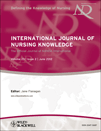
International Journal of Nursing Knowledge
Empowering nursing professionals through research and insight.The International Journal of Nursing Knowledge, published by WILEY, stands as a leading platform for advancing nursing scholarship, offering critical insights in both fundamentals and innovative research within the nursing field. With an ISSN of 2047-3087 and an E-ISSN of 2047-3095, this journal has garnered an impressive reputation, frequently ranking in the Q1 and Q2 quartiles across pivotal areas such as Fundamentals and Skills, and Research and Theory, respectively. Notably, it holds a Scopus rank of #5 in Nursing Fundamentals and Skills and #8 in Nursing Research and Theory, reflecting its high impact and relevance in shaping nursing education and practice. Since its inception in 2012, the journal has been devoted to fostering scholarly communication and knowledge across the nursing discipline, complementing both research and practical know-how. The journal is also aligned with open access principles, ensuring that cutting-edge nursing knowledge is accessible to a broad audience. With a commitment to rigor and excellence, the International Journal of Nursing Knowledge serves as an essential resource for nursing professionals, researchers, and students alike, dedicated to enhancing patient care through evidence-based practice.
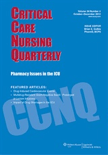
Critical Care Nursing Quarterly
Empowering Nurses with Cutting-Edge InsightsCritical Care Nursing Quarterly is a distinguished journal published by Lippincott Williams & Wilkins, catering to the vital field of critical care nursing. With an ISSN of 0887-9303 and an E-ISSN of 1550-5111, this journal has been contributing to the advancement of nursing practices since its inception in 1987. Over the years, it has gained recognition, earning a Q3 ranking in Critical Care Nursing for 2023 with a Scopus rank of #9 out of 27, placing it in the 68th percentile of its category. As a non-open access journal, it offers a curated selection of high-quality articles designed to disseminate critical findings, innovative practices, and essential reviews relating to nursing in critical care settings. The journal's ongoing commitment to improving patient care through research and education highlights its pivotal role in shaping the future of critical care nursing. For researchers, professionals, and students alike, Critical Care Nursing Quarterly serves as an indispensable resource in a field that impacts lives daily.
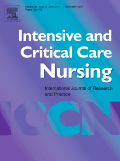
Intensive and Critical Care Nursing
Advancing critical care through rigorous research.Intensive and Critical Care Nursing is a premier peer-reviewed journal published by Elsevier Science Ltd, dedicated to advancing the field of critical care nursing through high-quality research, innovative practice, and critical analysis. With an impressive impact factor, this journal is recognized as a leading resource in Critical Care Nursing, holding the esteemed Q1 quartile designation and ranking first among 27 journals in its category, placing it at the 98th percentile. Since its inception in 1992, the journal has been committed to fostering an interdisciplinary dialogue among researchers, clinicians, and educators, ultimately aiming to improve patient outcomes in critical care settings. While currently not offering open access options, the journal is highly accessible through leading academic databases, ensuring that cutting-edge research reaches its intended audience. Explore the latest findings and developments in critical care nursing that shape and influence practice across the globe.
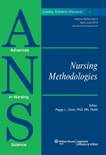
ADVANCES IN NURSING SCIENCE
Inspiring Change, Enhancing Nursing Excellence.Advances in Nursing Science, an esteemed journal published by Lippincott Williams & Wilkins, delves into the multifaceted realm of nursing scholarship and practice. With an ISSN of 0161-9268 and an E-ISSN of 1550-5014, this influential periodical has been fostering rigorous academic discourse since its inception in 1978, and it continues to shape the landscape of nursing research through 2024 and beyond. Recognized in the 2023 Scopus rankings as a Q2 journal in the field of Nursing (miscellaneous), it holds the impressive rank of #48 out of 139, positioning it in the 65th percentile among its peers. While it offers traditional subscription access, the journal's commitment to disseminating high-quality research makes it a vital resource for researchers, healthcare professionals, and nursing students striving to enhance their practice and academic endeavors. By addressing contemporary issues in nursing and healthcare, Advances in Nursing Science is dedicated to advancing the science of nursing and promoting excellence in patient care.

Nursing Open
Elevating the standards of nursing through impactful studies.Nursing Open is a premier open access journal published by WILEY, dedicated to advancing the field of nursing and healthcare research. With its ISSN 2054-1058, this journal has been at the forefront of disseminating innovative and impactful research since its inception in 2014. As an open access platform, it ensures that knowledge is accessible to all, promoting collaboration and engagement among researchers, practitioners, and students. Hailing from the United States and located at 111 River St, Hoboken, NJ 07030, Nursing Open has established itself as a vital resource in the nursing discipline, reflected in its impressive Q1 ranking in the 2023 category of Nursing (miscellaneous) and Scopus ranking of #36 out of 139 in General Nursing, placing it in the 74th percentile. With a commitment to high-quality research and a focus on contemporary issues in nursing, this journal invites contributions that foster evidence-based practice and enrich the global nursing community.
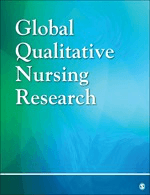
Global Qualitative Nursing Research
Connecting researchers and practitioners for a healthier world.Global Qualitative Nursing Research, published by SAGE Publications Inc, is a premier open-access journal dedicated to advancing the field of qualitative research within nursing. Since its inception in 2014, this journal has championed the dissemination of innovative and impactful findings that enhance the understanding and practice of qualitative methodologies in nursing and healthcare contexts. With an impressive Scopus ranking of #43 out of 139 in General Nursing, placing it in the 69th percentile, and achieving a Q2 quartile ranking in 2023, it stands as a vital resource for researchers, practitioners, and students alike. The journal embraces a wide array of qualitative approaches, fostering a diverse academic dialogue that influences nursing practice, education, and policy on a global scale. As an open-access publication, it ensures that critical research is widely accessible, facilitating knowledge transfer and supporting evidence-based practices in nursing across the globe. Addressing crucial themes in nursing and qualitative research, Global Qualitative Nursing Research is positioned as an indispensable platform for the scholarly community, driving both inquiry and innovation in the nursing discipline.

Journal of Korean Academy of Nursing
Empowering Healthcare with Innovative Nursing Insights.The Journal of Korean Academy of Nursing, published by the Korean Society of Nursing Science, is a leading peer-reviewed journal dedicated to advancing the field of nursing research and practice. Established in 2008, this journal serves as a platform for innovative studies and discussions that address the challenges and developments in nursing. With an impressive 2023 category quartile ranking of Q2 in the field of Nursing and General Nursing, it ranks #58 out of 139 journals, placing it in the 58th percentile—a testament to its scholarly impact. Focused primarily on the nuances of nursing in South Korea and beyond, the journal fosters collaboration among various healthcare professionals and researchers, striving to improve nursing practices through empirical research and evidence-based insights. The journal is accessible to those seeking to engage with the latest findings and trends in nursing, further solidifying its role as an essential resource for researchers, practitioners, and students alike. For access and further details, please refer to the journal's homepage.

Nursing Reports
Transforming Patient Care with Innovative FindingsNursing Reports is a prominent open-access journal dedicated to disseminating scholarly research in the field of nursing and healthcare. Published by MDPI since 2020, the journal is based in Italy and features an ISSN of 2039-439X and an E-ISSN of 2039-4403. With rapid advancements in nursing practices and education, the journal serves as a vital platform for researchers, professionals, and students to share innovative findings and insights that enhance patient care and nursing methodologies. Recognized for its quality, the journal is ranked in the Q2 category in Nursing (Miscellaneous) for 2023, alongside a respectable position in the Scopus ranks, holding place #53 out of 139 in General Nursing, placing it in the 62nd percentile. The journal's commitment to fostering a collaborative research environment is underscored by its open-access model, allowing for unimpeded access to cutting-edge nursing research worldwide. As "Nursing Reports" continues to grow from its inception into its converged years spanning from 2014 to 2024, it plays a crucial role in the progression of the nursing profession and the overall healthcare landscape.
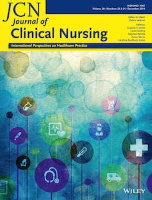
JOURNAL OF CLINICAL NURSING
Shaping the future of healthcare through evidence-based nursing.The JOURNAL OF CLINICAL NURSING, published by WILEY, stands as a prestigious platform within the realm of nursing and medical research in the United Kingdom. With an ISSN of 0962-1067 and an E-ISSN of 1365-2702, this journal has been a cornerstone of scholarly communication since its inception in 1992. Spanning a comprehensive scope of clinical nursing practices and innovations, it consistently ranks in the first quartile (Q1) according to the latest metrics in both the disciplines of nursing and general medicine. The journal holds a commendable Scopus ranking of 8th out of 139 journals in General Nursing, placing it within the 94th percentile, which underscores its importance and influence in the academic community. Although it does not currently offer Open Access options, the JOURNAL OF CLINICAL NURSING provides an invaluable resource for researchers, healthcare professionals, and students, aiming to enhance clinical practices and address contemporary challenges within the field of nursing.

Nursing-Research and Reviews
Illuminating the path of nursing with impactful research.Nursing-Research and Reviews is a prominent open-access journal published by DOVE MEDICAL PRESS LTD, dedicated to the dynamic field of nursing research. Since its inception in 2011, this journal has served as a vital platform for disseminating peer-reviewed articles, review papers, and original research that contribute to evidence-based nursing practice and education. With an ISSN of 2230-522X, it provides valuable insights into the latest developments and trends in nursing, aiming to bridge the gap between academia and clinical practice. The journal's commitment to open access ensures that its content is readily available to researchers, practitioners, and students worldwide, promoting a broader dissemination of knowledge. As part of a reputable publisher recognized for its focus on advancing medical and scientific understanding, Nursing-Research and Reviews plays a crucial role in shaping the future of nursing through innovative research and inclusive dialogue.